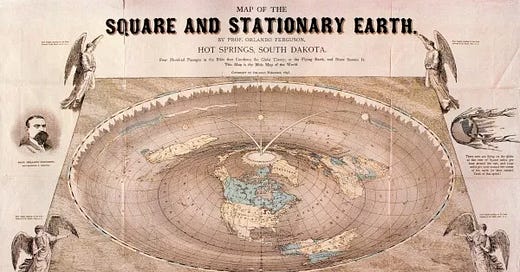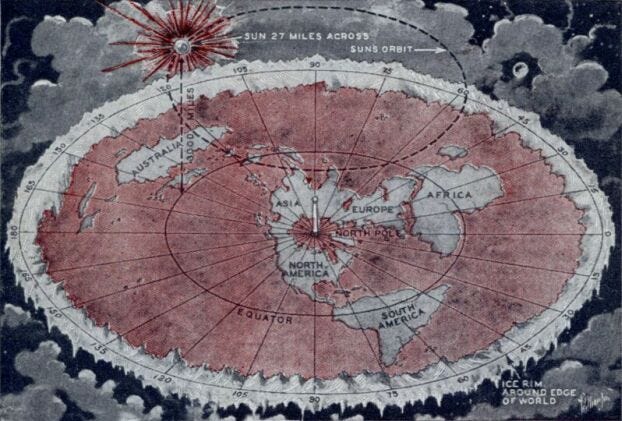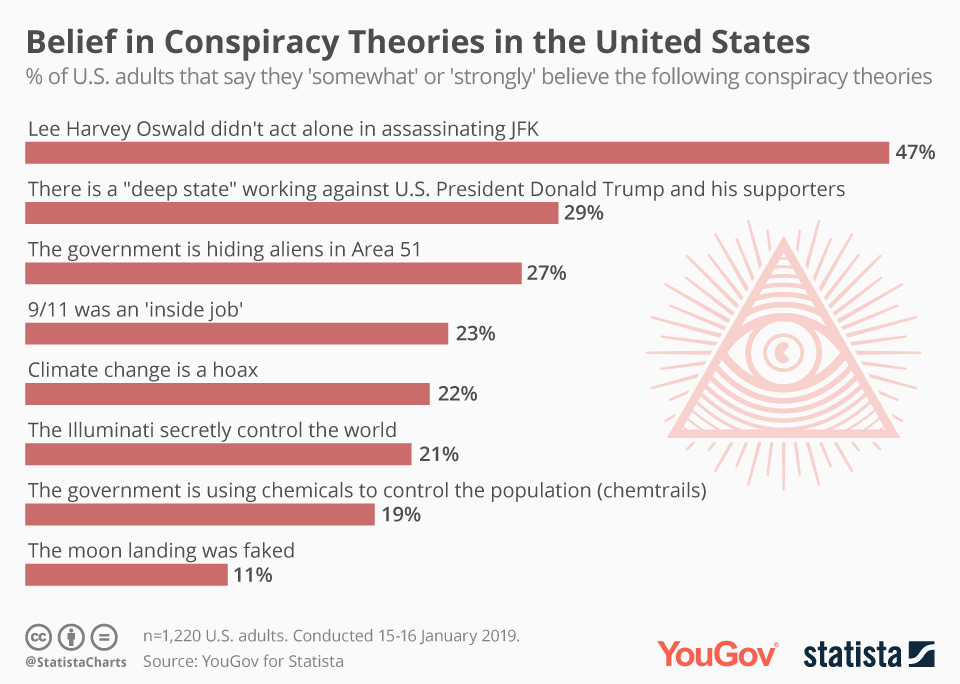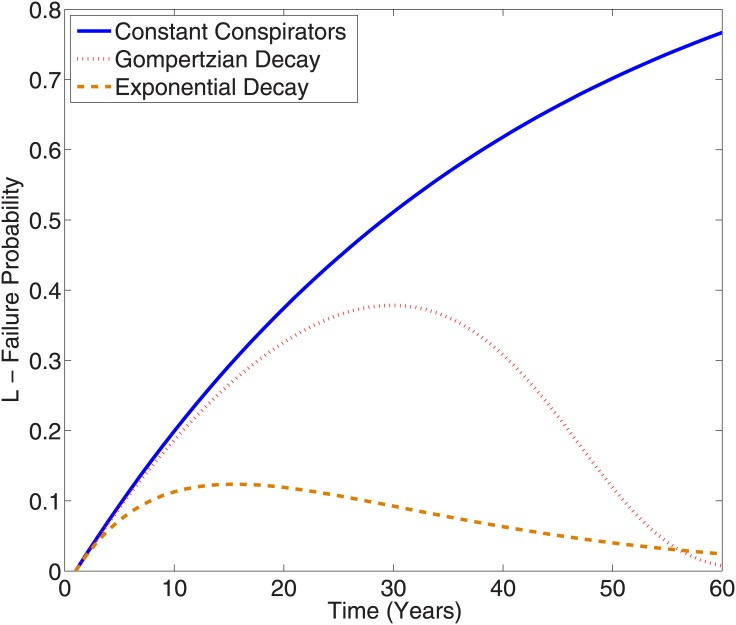When Columbus lived, people thought that the Earth was flat. They believed the Atlantic Ocean to be filled with monsters large enough to devour their ships, and with fearful waterfalls over which their frail vessels would plunge to destruction.
A characteristically accurate schoolbook
I
I have a confession. I really like the Flat Earth theory. The theory that we live on a large disc that flies through space, instead of a globe. That the entire world, led by NASA, is in on a conspiracy to create doctored images of a globe. That the effect of seeing the horizon isn't actually true. That the disc accelerates upwards creating the impression of gravity. I of course think its absurd and incorrect, about as true as the Marvel movie science, but I can’t deny that it is a guilty pleasure.
I'm not alone. There's a society called International Flat Earth Research Society (IFERS, the highly credible-sounding acronym), which was set up in 1956, that's still active today.
A YouGov survey of more than 8,000 American adults suggested last year that as many as one in six Americans are not entirely certain the world is round, while a 2019 Datafolha Institute survey of more than 2,000 Brazilian adults indicated that 7% of people in that country reject that concept
It’s smaller than the number of Discworld fans worldwide but the mythology is compelling. It started back in the 1800s, founded by Samuel Birley Rowbotham, an English inventor who decided to read the Bible literally. He seemed a bit of a quack, having multiple pseudonyms and calling himself a fake Doctor to sell "the world's best nerve restorer" as Dr. Birley's Phosphorus. And he came up with a theory of Zetetic Astronomy, which explained how the earth is a flat disk, published under the amusing name Parallax.
The earth disk, in this conception, has the Arctic in the center (the hub) and the Antarctic at the rim. The rim has high snowy mountains, or an ice wall, beyond which lay lands yet unexplored. If this reminds you of Discworld you're not alone.
It spread to the United States, largely in the town of Zion, Illinois, where it had a tiny resurgence and timeline of slight decline until the 1950s. And then, the International Flat Earth Society was founded by Samuel Shenton, a Fellow of Royal Astronomical Society and the Royal Geographic Society, and things started to take off!
The claim of the conspiracy theorists is that NASA and other government agencies are conspiring (and have been conspiring since the 50s) to fabricate evidence that the Earth is spherical. NASA in this image is a hyper-competent organisation of the sort we can only dream of. Amongst other things they are guarding an ice wall near Antarctica, the wall that surrounds the earth. I don't know if they prefer the Game Of Thrones method to send the rejects to guard the wall or if they send hyper competent astrophysicists with good workout ethics, but its something that I hope gets investigated further.
The great part of this theory is how expansive it is. Let's see. We regularly fly in planes around the world, surely the pilots must know! Ah they would, but the GPS devices are actually rigged to make pilots think they're flying in straight lines around a sphere!
You think you know better because you've flown on an airplane? How silly you are. Of course there's a video that has amateur experimentation done to disprove such silly suppositions.
I recorded a 23 minute and 45 second time-lapse, which by those measurements means the plane travelled a little over 203 miles. According to Spherical Trigonometry given to explain the Heliocentric model, this should have resulted in the compensation of 5 miles of curvature. As you'll see there was no measurable compensation for curvature.
Similarly, there's the sad and absurd story of Mike Hughes, who rode a self-made rocket to his demise. He said in interviews that he distrusted science, but trusted fluid dynamics because that's "just a formula". And what about the rest of science?
Currently, there is disagreement among flat-Earthers about whether or not Einstein's theory of relativity permits Earth to accelerate upward indefinitely without the planet eventually surpassing the speed of light.
A key fact about conspiracy theories is their love for individual experimentation, like the one above. I mean, you can't easily blame some of the members for being idiots, or for not understanding any science. They're not the idiot Neanderthal cavemen they sound like. They're people infected with a mind virus. A virus which has infiltrated a substantial proportion of their thought.
They're not all complete kooks. For what its worth, several Flat Earthers also support global warming and evolution. The rejection of the roundness of the earth funnily enough is not the rejection of the entire scientific apparatus.
Its also an interesting demonstration of how impossibly difficult it is to find a theory that's true that corresponds to the real world. Because for any sufficiently complex system, the list of possible explanatory theories is vast. Far larger than can be easily assessed, and this means that learning some epistemology becomes indispensable.
Scientists do it too, according to the Flat Earthers. We constantly mock theories that fall out of the mainstream, and occasionally some of them are right. Does that mean we should be rational and continue the mockery because 95% of the time we're right? Or does this mean we should avoid mockery to give importance to the 5% chance that we're wrong? Or as they put it:
People don't really know 100% what [the Earth] is, we're just questioning what we're being told it is
So within two minutes of starting a discussion you're down at the meta level of "what is truth" or "why is my observation invalid but yours is valid" or "why should I believe your experts rather than my experts", all of which are much much much harder problems to solve than simple empirical facts.
Perhaps it means that we should accept that coming up with theories is a hard business, and inherently has many more failure modes than can be easily or simply addressed. We resort to heuristics like Occam's Razor, because they work.
Part of the new group of theories includes another fantastic one that I fell in love with. It suggests that there are no forests. What we think of as forests are just tall shrubs, and what used to be forests (kilometer tall trees whose base is so wide that the Devil's Tower in Wyoming is a stump) is no more. The forests of yore died out in a cataclysm. Those were the "real trees", and all we see when we look around are the stumps. This "explains" how the Giants Causeway in Ireland is an organic structure, petrified through unknown means.
As a theory, I find this magnificent. It's utterly ridiculous, but there's a mythology that's built into its core in a way that no real scientific theory can. Even as you read it you can just see in your minds eye the giant, towering forests standing kilometers tall, getting mowed down through a cataclysmic event,
There's a popular myth that we used to believe that the earth was flat during the middle ages. Turns out this just was not true in any meaningful sense.
[CS] Lewis draws attention to the fact that in Dante's The Divine Comedy, about an epic voyage through hell, purgatory and heaven, the Earth is spherical with gravity being towards the center of the Earth. As the Devil is frozen in a block of ice in the center of the Earth, Dante and Virgil climb down the Devil's torso, but up from the Devil's waist to his feet, as his waist is at the center of the Earth.
Which actually means that our modern flat earth movement might be the first of its kind!
II
Conspiracy theories have been around for a long long time.
In Medieval times, conspiracy theories led to major tragedies including the killing of Jews (who were for instance accused of conspiring to poison drinking wells, as a means of explaining disease epidemics) or witch hunts (i.e., young women who were accused of conspiring with the Devil and therefore burnt alive). One can even find conspiracy theories in the writings of the ancient Roman senator and historian Tacitus (Annal XV, 38–44), who described how Roman citizens believed that Nero and his loyal servants deliberately had ignited the great fire of Rome in the year 64 AD (for details, see Brotherton, 2015; Van Prooijen & Douglas, 2017).
One of the interesting aspects of most conspiracy theories is that it presupposes an incredibly powerful and effective government. While the theories are constantly reinforced by actions that demonstrate the ineptitude of governments, like when NASA makes a "mistake" covering up their moon landing by not keeping the magnetic tapes intact, it also only survives by believing strongly in their efficacy.
One that can not only create large, globe-spanning, conspiracies, but have the ability to carry them out smoothly. This stands in direct contrast with the other commonly held view that governments in general are inept and useless at getting anything done.
The critical aspect of belief that underscores whether or not a conspiracy can be successful is how many people actually know about it, and what the potential is for a "leak", which exposes the conspiracy and renders it redundant.
And that's exactly what this paper by David Grimes of Oxford modelled. If the conspiracy is a single event, then you don't need new conspirators over time, which also reduces the probability of exposure.
This is especially visible when you look at conspiracy theories that came true.
NSA PRISM affair - where the NSA spied on its allies and civilians, exposed by Edward Snowden
FBI forensic scandal - FBI forensics held a large number of innocent men detained for decades, exposed by Frederic Whitehurst
This also means that we can estimate the maximum time to imminent failure of the theory.
So if some of you out there are looking to create a conspiracy theory, and you want it to have staying power over a long period of time, turns out you need to just tell a smaller number of people.
III
Conspiracy theories give people agency. They make everyone feel powerful, as if they know something that others don't, that they are in possession of truth. It creates an entire mental edifice that can simultaneously explain a whole bunch of inconvenient facts and create a better story than reality.
Conspiracy theories have all the elements of a good story – terrifying villains, creative plots, and moral lessons. Because of this, a well-constructed conspiracy can have a powerful hold on the public imagination, in a way that a narrative about a “virus emerged entirely unpredictably and killed thousands for no reason” is unlikely to be able to rival.
The popular conspiracy theories engage some of the worries that everyone has. For instance:
Most people of power seem to know each other, its a relatively closed circle
Almost everyone converts money to influence and influence to money relatively easily
A large portion of what the institutions of the society does (govt, science, media) is shrouded in confusing narratives and lies
The resurgence of the Flat Earth theory tells us more about our inability to trust the institutions that surround us more than the specific claims or the cosplay involved. There's been an intimate relationship between power and knowledge forever, and conspiracy theories are the relationship between powerlessness and knowledge.
Though with plenty of blind spots, they seemingly encourage independent thinking, and individual experimentation. And that's true despite the well publicised mistakes that comes from shooting homemade rockets into the air.
What's surprising is to what extent this echoes our own current cultural anguish - the large number of articles and talking heads saying don't trust the experts, especially post Covid and the financial crash - from all sides of the political spectrum. "Do your own research" is the mantra for cranks and the iconoclasts.
In The Hitchhikers Guide To The Galaxy, there's a point where Zaphod Beeblebrox walks into the Total Perspective Vortex, which shows how insignificant you are in the cosmic scale of things. He walks out realising he's not insignificant, but rather the center of it. That's the same belief the flat earthers hold.
The belief system for Flat Earthers seems the societal equivalent of bugs in the operating system. We should learn from them and use them as dojos of imagination. Not as something that has a facet of truth, but a fun alternate reality to wrestle with. Of discovering the limits to empiricism without falling prey to solipsism or solely relying on sense data. It's even useful to use it as a testing ground to see how we can take obviously silly premises and use them to train our ability to follow through a complex logic chain.
What I found fascinating was also how much fun it was. It's closer to reading a thorough exploration of the exact extent of Captain Marvel's powers and how they relate to the Eternals. It's fun, and it hijacks your logical self into exploring an alternate universe!
How do we simultaneously encourage independent thinking while stamping out these theories? I'm not sure there is a way. The existence of a large number of fringe theories is evidence that we're exploring the thin ends of the distribution. We could even use them as training to help think through alien thought processes. We can only hope that the ones that are explored are this much fun.
Like everything else, there are gradations of conspiracies. When you stop vaccinating your kids because of a conspiracy theory, that's of course terrible. When you believe that the earth is flat, its slightly less immediately life threatening. And somewhere in the middle is the line.
I like the idea that there exist a platonic world of alternate theories, which make up for the fact that they’re completely absurd with the fact that they are inexplicably exciting.
And the best news of all is that their love of experimentation hasn't changed the value of pi.
So there's that.













Regarding an item on the top level of the conspiracy chart: Celebrities do use moisturizer that is made in part from the foreskins of babies. It's well documented. For instance, The Guardian and Huffington Post have both written about the phenomenon. Probably other respected news sites have as well. Check your search engine if you don't believe me.
Wow, this was great. Really enjoyed it. I was just thinking earlier today about how fascinating I found Chariots of the Gods when I was a teenager - it was exciting and beguiling to my young mind. I’ll try to keep that in mind when I think ill of the folks denying the efficacy of vaccines - they’re just stuck in a strange…